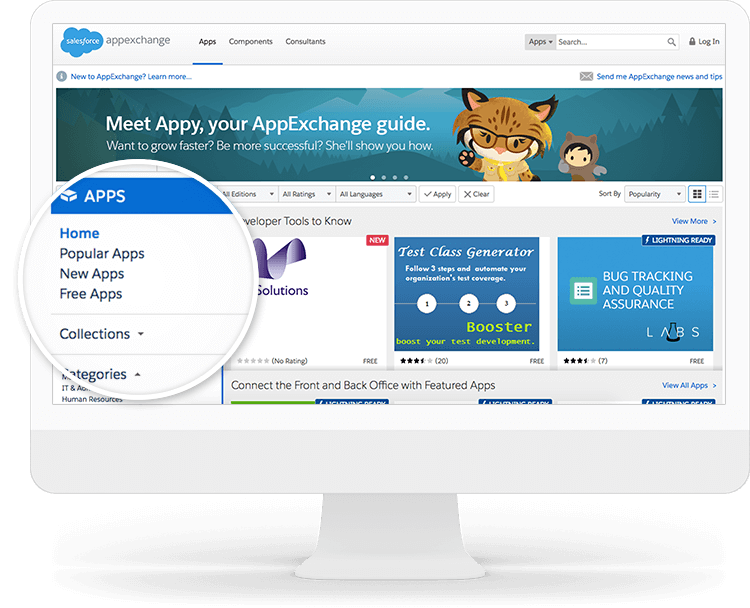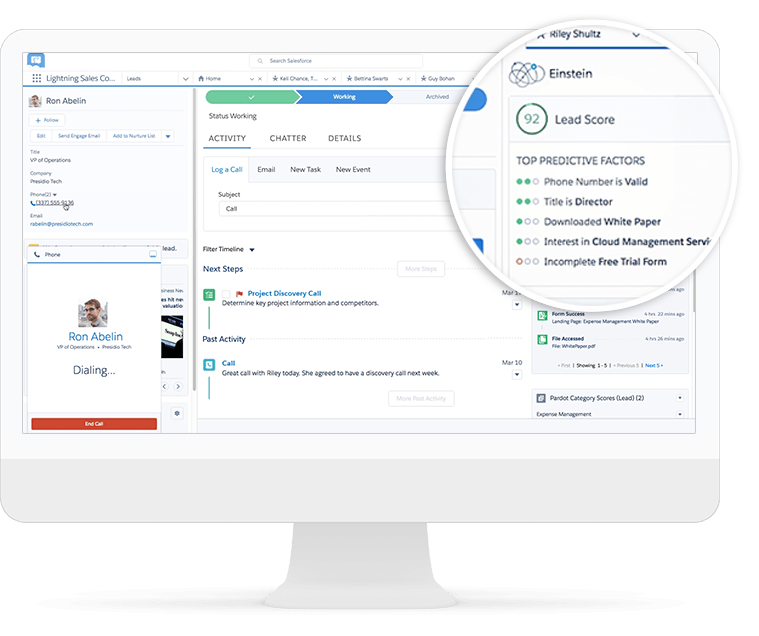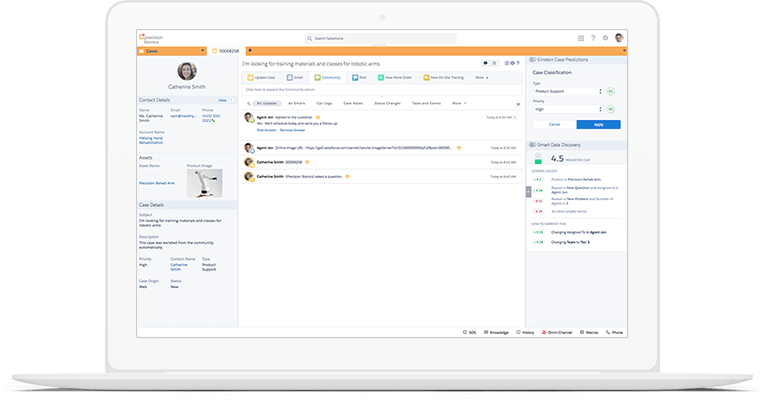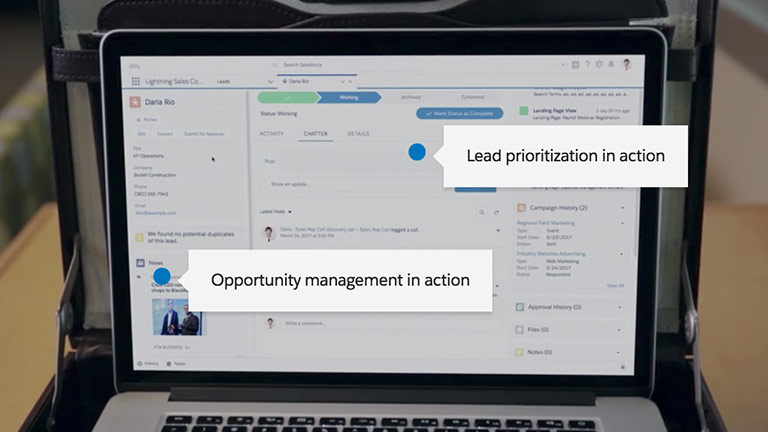“Creating your own customizable CRM has never been easier.”
Building your own customizable CRM with Workplace
This is a simple definition of CRM.
Customer relationship management (CRM) is a technology for managing all your company’s relationships and interactions with customers and potential customers. The goal is simple: Improve business relationships. A CRM system helps companies stay connected to customers, streamline processes, and improve profitability.
When people talk about CRM, they are usually referring to a CRM system, a tool that helps with contact management, sales management, productivity, and more.
A CRM solution helps you focus on your organisation’s relationships with individual people — including customers, service users, colleagues, or suppliers — throughout your lifecycle with them, including finding new customers, winning their business, and providing support and additional services throughout the relationship.
Who is CRM for?
A CRM system gives everyone — from sales, customer service, business development, recruiting, marketing, or any other line of business — a better way to manage the external interactions and relationships that drive success. A CRM tool lets you store customer and prospect contact information, identify sales opportunities, record service issues, and manage marketing campaigns, all in one central location — and make information about every customer interaction available to anyone at your company who might need it.
With visibility and easy access to data, it's easier to collaborate and increase productivity. Everyone in your company can see how customers have been communicated with, what they’ve bought, when they last purchased, what they paid, and so much more. CRM can help companies of all sizes drive business growth, and it can be especially beneficial to a small business, where teams often need to find ways to do more with less.
Here’s why CRM matters to your business.
Gartner predicts that by 2021, CRM will be the single largest revenue area of spending in enterprise software. If your business is going to last, you know that you need a strategy for the future. You have targets for sales, business objectives, and profitability. But getting up-to-date, reliable information on your progress can be tricky. How do you translate the many streams of data coming in from sales, customer service, marketing, and social media monitoring into useful business information?
A CRM system can give you a clear overview of your customers. You can see everything in one place — a simple, customisable dashboard that can tell you a customer’s previous history with you, the status of their orders, any outstanding customer service issues, and more.
You can even choose to include information from their public social media activity — their likes and dislikes, what they are saying and sharing about you or your competitors. Marketers can use a CRM solution to better understand the pipeline of sales or prospects coming in, making forecasting simpler and more accurate. You’ll have clear visibility of every opportunity or lead, showing you a clear path from inquiries to sales. Some of the biggest gains in productivity can come from moving beyond CRM as a sales and marketing tool, and embedding it in your business – from HR to customer services and supply-chain management.
Though CRM systems have traditionally been used as sales and marketing tools, customer service teams are seeing great benefits in using them. Today’s customer might raise an issue in one channel — say, Twitter — and then switch to email or telephone to resolve it in private. A CRM platform lets you manage the inquiry across channels without losing track, and gives sales, service, and marketing a single view of the customer.
Running a business without CRM can cost you real money.
More administration means less time for everything else. An active sales team can generate a flood of data. Reps are out on the road talking to customers, meeting prospects, and finding out valuable information – but all too often this information gets stored in handwritten notes, laptops, or inside the heads of your salespeople.
Details can get lost, meetings are not followed up on promptly, and prioritising customers can be a matter of guesswork rather than a rigorous exercise based on fact. And it can all be compounded if a key salesperson moves on. But it's not just sales that suffers without CRM.
Your customers may be contacting you on a range of different platforms including phone, email, or social media — asking questions, following up on orders, or contacting you about an issue. Without a common platform for customer interactions, communications can be missed or lost in the flood of information — leading to a slow or unsatisfactory response.
Even if you do successfully collect all this data, you’re faced with the challenge of making sense of it. It can be difficult to extract intelligence. Reports can be hard to create and they can waste valuable selling time. Managers can lose sight of what their teams are up to, which means that they can’t offer the right support at the right time – while a lack of oversight can also result in a lack of accountability from the team.
What does a CRM system do?


Here’s how a CRM system can help your business today.
1. Make improvements to your bottom line.
Source: Workplace Relationship Survey conducted 2014–2016 among 10,500+ customers randomly selected. Response sizes per question vary.
2. Identify and categorise leads.
A CRM system can help you identify and add new leads easily and quickly, and categorise them accurately. By focusing on the right leads, sales can prioritise the opportunities that will close deals, and marketing can identify leads that need more nurturing and prime them to become quality leads.
With complete, accurate, centrally held information about clients and prospects, sales and marketing can focus their attention and energy on the right clients.
3. Increase referrals from existing customers.
By understanding your customers better, cross-selling and upselling opportunities become clear — giving you the chance to win new business from existing customers.
With better visibility, you’ll also be able to keep your customers happy with better service. Happy customers are likely to become repeat customers, and repeat customers spend more — up to 33% more according to some studies.
4. Offer better customer support.

5. Improve products and services.

Want to sell more, faster? Skip ahead.
Here’s how a CRM can future-proof your business.
As the COVID-19 pandemic has proven, a business’ ability to be responsive to external changes can be make or break. With devastating impact, some businesses have fallen. Many have pivoted and been able to adapt their products or services to reach customers in a different way, garnering a whole new customer base. A few have grown – think ecommerce, logistics, and pharmaceuticals. But for all these businesses, it’s the customer who is at the centre.
So how can a CRM help your business? We look at how a robust system can ensure your business is ready for the age of the connected consumer, who expects a consistently excellent experience across the customer journey.
1. Boost customer experience with unified CRM systems for sales, marketing, and customer service.
A unified customer relationship management system can connect sales, marketing, and customer service to create a holistic view of a business’ customers. With 62% of customers prepared to share a bad experience with others, the benefits of ensuring the customer journey is optimal can’t be overstated. 66% of millennial consumers expect real-time responses and interactions, and 40% of all customers won’t do business with a company if they can’t use their preferred modes of communication. A CRM that stores all these interactions, across devices and times, can improve the customer experience.
The recent shift to online will outlast the pandemic. Two in five consumers in Singapore (37%) have increased their online shopping activities, and 3 in 4 (76%) indicated that they will not return to the same (lower) levels of online shopping before the outbreak.
Quickly responding to customer requirements is key to their experience. BINUS University collaborated with Workplace to achieve its goal of digital transformation. This partnership resulted in a 360 degree view of each student, where data can be used to guide the student journey. When the university had to close its campus during the pandemic,, its already advanced digital transformation allowed for the transition to a remote learning setting, while maintaining educational standards and student engagement.
2. Provide engaging and unbeatable user experience through hyper-personalisation.
In order to truly personalise the customer experience, businesses need to ensure that each interaction is defined by the customer themselves. 61% of millennials are happy to share personal data that leads to a more personalised shopping experience, and it’s this cohort that is embracing the benefits of hyper-personalisation.
Hyper-personalisation can refer to actually customising products; offering particular products in particular locations based on what’s trending; leveraging omnichannel data to personalise communications; or real-time engagement.
3. AI-Powered CRMs can improve decision-making and productivity.
Businesses can make smarter and faster decisions with help from Artificial Intelligence (AI). With 64% of customers expecting tailored engagement based on past interactions, marketing AI can collate data from interactions to predict the messaging your customers will most likely respond to. 71% of customers have used multiple channels to start and complete a single transaction, which is why using AI to track customers across mediums and devices is vital for sales. And at the operational end, 68% of customers would rather use self-service channels – like knowledge bases or customer portals – for simple questions or issues.
Marketers in Singapore expect 5G wireless networks, an expanded online population, and new regulations to have the greatest impact on their work over the next 10 years. A recent survey found that 72% of consumers and 83% of business buyers expect companies to use new technologies to create better experiences. For 5G, this means rich and dynamic personalisation for offers, products, and processes; self-service for zero-touch automation; engaging with customers on their preferred channels; and streamlining quote and purchasing processes.
4. Leverage the Internet of Things (IoT) to power customer engagement.
5. Improve retention through customer-oriented processes.
84% of customers say the experience that a company provides is as important to them as its products and services. It’s this experience that often drives retention. One out of three digital consumers in Southeast Asia will switch brands when they can’t find their preferred brands - however, 42% said they had bought more from established brands in recent months.
Zenyum has built one of the fastest growing smile cosmetic brands in Asia. During the pandemic, dental clinics had to close for some time. Zenyum pivoted to focusing on clients who were at the research phase of their “smile journey”. Zenyum also created a COVID-19 tag in their CRM, so they could identify customers who needed extra support.
A CRM can future-proof your business by connecting you with your customer – providing hyper-personalised engagement that is viewable across business teams, powered by data from connected devices and informed by AI, all designed to improve retention by focusing on your customer’s unique needs.

Here’s what cloud-based CRM offers your business.
Work from anywhere.
Reduce costs.
CRM can be quick and easy to implement. A cloud-based system doesn’t need special installation, and there’s no hardware to set up, keeping IT costs low and removing the headache of version control and update schedules.
Generally, cloud-based CRM systems are priced on the number of users who access the system and the kinds of features you need. This can be very cost-effective in terms of capital outlay, and is also extremely flexible — enabling you to scale up and add more people as your business grows. Workplace is flexible in terms of functionality, too — you’re not paying for any features that are not useful to you.
A cloud-based CRM platform offers you:
- Faster deployment
- Automatic software updates
- Cost-effectiveness and scalability
- The ability to work from anywhere, on any device
- Increased collaboration

